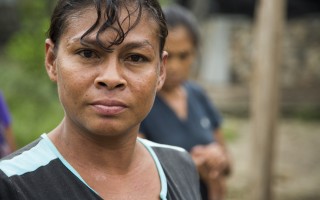Teacher. Daughter. Tailor.
Laban had to leave everything behind.
Laban, 19 years old: “My mother taught me how to tailor. Then I was also able to attend a school where I learned more skills and now I sew better than she does. I can make many types of clothes, but my favourite thing is designing blouses.
My mother is part of the women’s committee in the camp and when they said there would be tailoring classes I volunteered as a trainer. Some of the students are my friends, we are the same age, others are older and have never even touched the pedal of a sewing machine.
My experience as a trainer was… well, there are people who have difficulties in learning, who have never done anything, some are impatient, and some are very interested and work hard. So I started to learn about each individual’s behaviour and practically adapted to find a way of teaching that they can understand. I am not only teaching, I can also learn from my students including social skills.
While studying I provide training which enables me to continue practicing my tailoring skills. Now I am teaching them and I will go and study, and coming back to teach again. When we return home I would like to become a clothes designer as it is my interest, that’s my wish for the future.”
Laban Hut San exudes confidence that belies her 19 years. She and her family live in a camp for internally displaced people in Kachin State, in northeastern Myanmar along with about 2,000 other people. The camp sits on the bank of a river. “When bombs fell in these areas we had to hide in the mountains and escape across the river,” recalls one of the residents.
Refugees. Ordinary people living through extraordinary times. Share their stories.
The fighting between the Kachin Independence Army (KIA) and the Myanmar army resumed in June 2011, breaking a 17-year-long ceasefire agreement between the Myanmar government and the Kachin Independence Organization (KIO). To date the fighting has displaced more than 100,000 people. Roughly half of them live in areas beyond the control of the Government, where international organisations have limited and restricted humanitarian access. UNHCR has been responding to the humanitarian crisis by providing shelter and emergency relief items in the camps as well as closely monitoring the protection situation.
Small projects and activities, like tailoring lessons, provide displaced women with a safe source of income and encourage them to get together, share their concerns and help others. Increasingly, UNHCR is supporting displaced persons to initiate community-based activities to help the community help themselves.
MORE STORIES
Felisa – Farmer. Mother. Activist.
Felisa was persecuted by an illegal armed group.
Hany – Student. Brother. Poet.
“I left my home because of the war.”
Gisma – Teacher. Mother. Women’s representative.
“We walked and hid for more than three months.”





